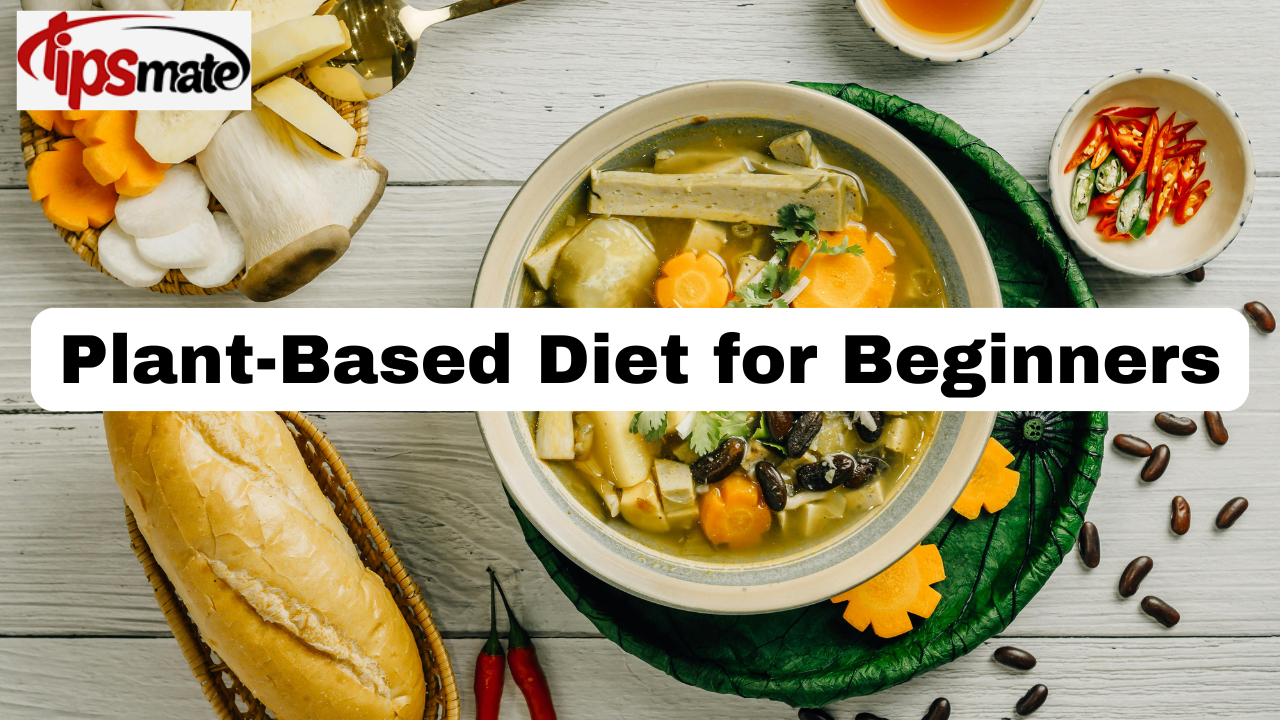Plant-Based Diet for Beginners
In today’s modern world, where people are more conscious about their diet and health, a diet based on plants has gained remarkable popularity. In this diet, people eat foods based on plants such as vegetables, fruits, grains, nuts, seeds, and legumes. But it doesn’t mean that animal products should be completely avoided, rather than that plant products are taken for better health and environmental conditions.
In the beginning, it seems hard to rely only on a plant diet but it takes some time to change lifestyle with some planning and you can enjoy very healthy, tasty, and nutritious foods. Then you can feel the power of plants in our lives. In this article, we will discuss about plant-based diet, its benefits, methods, and tips so you can feel easy and motivated to start.
What is a Plant-Based Diet?
Consuming plant foods like grains, vegetables, legumes, fruits, nuts, seeds, and plant-based oils is said to be a plant-based diet. It can be started when we include all the plant products in our diet and eliminate foods based on animal products like meat, eggs, fish, and dairy.
A plant-based diet doesn’t mean that you have to avoid all the animal-based products. It means you take more food based on plants as compared to animal-based food for their health, environment, and nutritional benefits. A plant-based diet includes:
1) Whole Grains
These include quinoa, brown rice, barley, and oats as they include important nutrients, fiber, and carbohydrates.
2) Vegetables and Fruits
These are the most important foods included in this diet which provide us with nutrition, minerals, fiber, and antioxidants.
3) Nuts and Seeds
Seeds like flaxseeds, chia seeds, and nuts like almonds and walnuts are important for high nutrients, protein, and healthy fats.
4) Legumes and beans
Chickpeas, black beans, peas, and lentils are good sources of iron, fiber, and protein.
5) Plant-based Proteins
Meat-based protein sources can be replaced with seitan, tofu, tempeh, etc.
A plant-based diet is very hard and difficult, some people adopt it slowly as they add plant-based food slowly into their daily lives for example they take a plant-based diet twice or thrice a week and then increase it gradually. The main goal is to increase the intake of plant-based products and decrease animal-based products to live a healthy life.
Benefits of Plant-based Diet
A plant-based diet has many benefits in many ways such as health, environment, and ethical as well. Some of the advantages are:
1. Health Benefits
- Many studies show that taking a plant-based diet helps to decrease cardiovascular diseases. This diet is rich in fiber, healthy fats, and antioxidants which can reduce blood pressure and heart diseases, and lower cholesterol levels.
- Many plant-based foods help in managing weight. It contains several nutrients and fiber which help to feel full for a longer time and they are low-calorie diet so helps in weight reduction.
- This diet helps reduce chronic diseases such as type-2 diabetes, cancer, and hypertension.
- A diet based on plants is rich in fiber which helps in better digestion and improves gut microbiome. It also helps in the proper functioning of the kidneys.
- Taking a plant-based diet in your daily life can help in healthy and glowing skin as plants contain vitamins, minerals, and antioxidants which help in skin's better health and reduce wrinkles and acne.
2. Environmental Benefits
- Animal food is extremely water-intensive as up to 1800 gallons of water is required to produce one pound of beef. While plant-based food uses less water.
- Producing food based on plants can consume fewer resources and emit fewer greenhouse gasses than animal-based food production. Carbon footprint is decreased due to the production of animal-based products.
- Reducing animal-based diets in our daily lives can help in limiting habitat loss, degradation, and deforestation. These activities are mostly done for preparing land for grazing and production of feed crops for livestock.
- The animal-based diet also leads to pollution. Animal waste, hormones, and antibiotics are considered to contaminate the water. This can be reduced by switching to plant-based foods.
3. Economic Benefits
- Plant-based diets can reduce medical expenses. When we eat a healthy diet (plant-based), there will be less chance of chronic diseases such as heart disease, diabetes, cancer, etc.
- Plant-based foods are budget-friendly, such as beans, lentils, vegetables, and grains as compared to animal-based products. Some plant foods are expensive too but they can be less expensive if we purchase them in bulk.
4. Quality of Life
- Many researches showed that people who eat a plant-based diet have a longer lifespan. A study showed that vegetarians are spoused to live longer and have a low risk of chronic diseases as compared to people who eat animal-based foods.
- People who eat plant-based food feel more energetic and conscious due to the nutrient-dense nature of plant foods.
- Research also showed that eating plant foods improves gut microbiome, moods, and mental health by reducing inflammation. It keeps better health of the brain.
5. Anti-Inflammatory Effects
- Foods like leafy green vegetables, berries, and nuts may help to reduce chronic inflammation in the body as these foods are rich in source of anti-inflammation.
- This is also beneficial for people dealing with the conditions of autoimmune disease and arthritis.
How to Start a Plant-Based Diet
Starting a diet based on plants is rewarding and beneficial for the brain and overall health. It is also beneficial for the environment and gives a longer lifespan. Here is step-by-step guidance for switching to a plant-based diet for beginners.
1. Educate Yourself
First of all, beginners need to understand what the actual plant-based diet is. It focuses on whole plants like vegetables, fruits, nuts, seeds, and legumes. Once you start this diet, you have to exclude or minimize all the animal-based products to get more effective results.
2. Start Gradually
- Reduction of Animal Products: When first switching to a plant-based diet, you should skip or reduce meat, dairy, or other animal products.
- Meatless Days: Try having meat two or three days a week, skip meat some days.
- Plant-based meals: Try new recipes based on plants for breakfast, lunch, or dinner.
3. Focus on Whole Foods
- Always give priority to whole grains, vegetables, fruits, legumes, lentils, nuts, seeds, beans, and healthy fats like avocado and vegetable oils such as olive oil.
- Minimize or avoid processed foods like meat products or vegan junk foods.
4. Meals Planning and Recipes
- Meal planning helps you to ensure that you are eating healthy and balanced food.
- It also reduces the urge to eat animal-based food.
- Explore recipe books, websites, channels, and apps that focus on vegetables or plant-based food recipes.
- Try cooking new dishes by replacing animal products with plants. Such as adding tofu in place of egg and using lentils instead of ground meat.
5. Listen to Your Body
- Always make sure that you are taking enough nutrients, minerals, and calories to maintain energy.
- Always be careful of the changes in your body that occur while eating plant-based foods. If you feel any deficiency, take supplements (B12, Vit. D).
6. Stay Consistent but Flexible
- Don’t be too strict to follow a plant-based diet. If you are switching, it is normal to take non-plant food occasionally.
- With time, plant-based eating will become natural and easier to follow. You will be in love when you discover new plants and new recipes.
By following these steps, you can switch to a plant-based diet more easily. You can contribute to a healthy lifestyle and environment as well.
In conclusion, taking a plant-based diet in our daily lives offers great benefits, and has a positive impact on health, the environment, the economy, and ethics. If we talk about health benefits, it helps to reduce many chronic diseases like heart disease, diabetes, and certain types of cancers. It also helps in weight management and overall well-being. Environmentally, a plant-based diet helps to reduce carbon footprint, support biodiversity and conserve water. It also promotes practices of sustainable farming. Ethically, eating foods based on plants minimizes animal exploitation, and reduces the demand for animal products which contributes to animal welfare.
In addition, a plant-based diet helps in improving brain and overall health, supports longer lifespan, and is also less expensive. Switching to plant-based foods in daily routine is a great and powerful choice. It helps in maintaining good health and also benefits the environment and its inhabitants, making a clean and pure planet.















